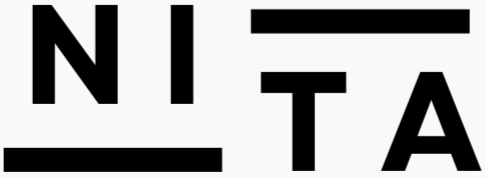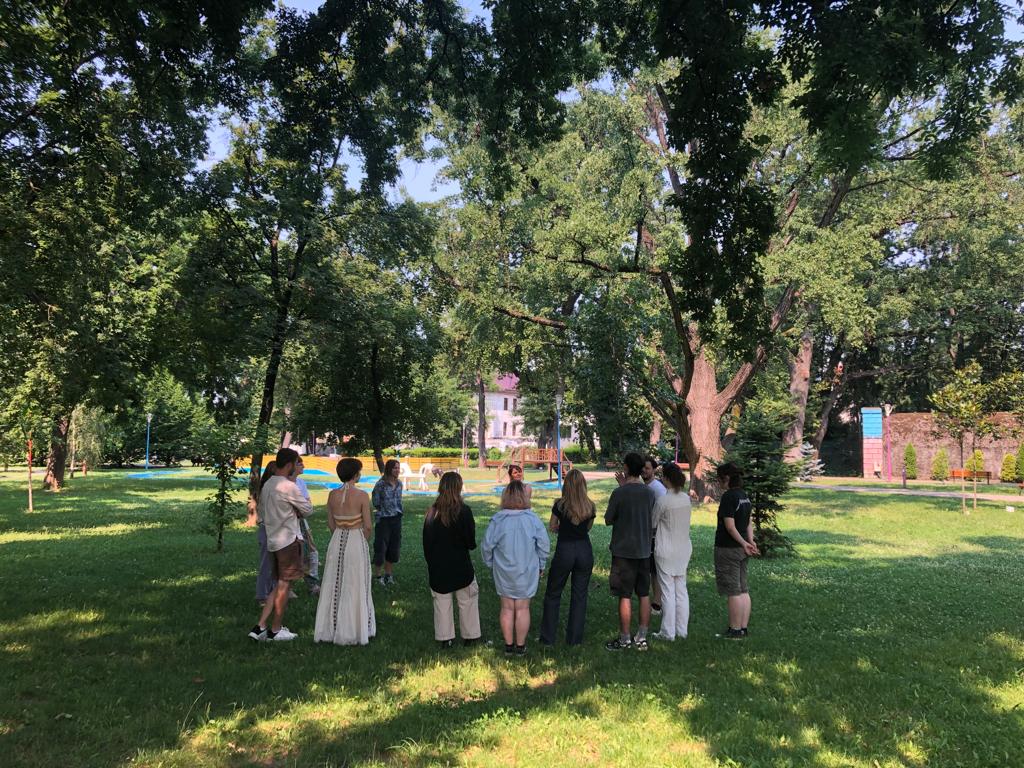The workshop was held within the nomadic contemporary art camp Minitremu Art Camp #8, on July 10, in Timișoara Children’s Park.
I decided to create an experimental workshop, and thanks to the Minitremu team I was able to put into practice what as a teaching artist is more difficult to achieve in a formal setting, the workshop is based on my artistic practice and is at some conceptual distance from my activity of teacher that is related to digital education.
Short introduction
Art, according to climate philosopher Timothy Morton, cannot be reduced to its parts, to the materials from which it is made, neither to the artist’s life nor to its historical context. Art emanates from something beyond, from the unseen, in the sense that we are not responsible for it and cannot perceive it directly, in front of us, constantly present. It’s something about magic. It has an effect on us, even if we cannot comprehend it, the cause is unclear to us. And this is strange to us.
A work of art is like a transparent bag full of eyes, and each eye is also a transparent bag full of eyes. There is something inherently weird, even disgusting, about beauty itself, and this weirdness gets mixed back in when we consider things in an ecological way. This is because beauty just happens, without our ego cooking it up.
Being Ecological by Timothy Morton, 2021, 50
By defamiliarization we talk about familiar things in an unfamiliar way, causing us to stop and consider a phenomenon, a situation a little more. Except that the phenomenon is us and the interaction with the rest of the biosphere, with „nature”. Defamiliarization is also an exercise in magical ecology when it comes to the Anthropocene/Capitalocene. Magical ecology investigates collaboration and coexistence with non-human beings. In the workshop we set out to write strange stories about familiar things related to nature and to connect these stories to amulets, as container objects of ambiguous meaning with a strange power that moves us unpredictably. We also watched a number of materials related to magical ecology and speculative realism. Key terms discussed throughout the workshop were: intuition, defamiliarization, mindsets, nature, wishful thinking, control, slowing down, intention, magic, ecological.
Slow pedagogy – the method
The workshop was conceived as a detour from art education through meditation to speculative realism (contemporary philosophy) through the practice of creating objects „with a magical intent” to ecology. I chose this strange entanglement of ideas and practices to reach an area of ambiguity in the perception of immediate human reality and the awareness of the presence of the reality of non-human beings, ambiguity then we turned on all sides through exercises in creative writing, drawing and sewing. I specifically chose sewing because of the effort it requires of concentration and visualization (tactile, sensory), to which I also added pressure by the intention pursued through the amulet/textile object made. From the beginning to the end the game between the self-awareness as a living body, the awareness of the ambience and the environment and the artistic practice as ecology was subtly maintained through the steps followed as stages of a slow pedagogy process. Slow pedagogies take into account the pace of each participant in education, they develop around the idea of meeting the world and meeting yourself in this world/relationship with the world, focusing on the body and its awareness as part of the world, a in-depth knowledge with all the risks that involve them, the choice of methods adapted to the context without the constraint of quickly quantifiable results, they are ecological and aim towards sustainability, of often alternative strategies.
It is this misguided impatience that pushes education into
Beautiful Risk of Education By Gert J. J. Biesta, 2013, 04
a direction where teachers’ salaries and even their jobs are made dependent upon their alleged ability to increase their students’ exam scores. It is this misguided impatience that has resulted in the medicalization of education, where children are being made fit for the educational system, rather than that we ask where the causes of this misfit lie and who, therefore, needs treatment most: the child or society. The educational way, the slow, difficult, frustrating, and weak way, may therefore not be the most popular way in an impatient society. But in the long run it may well turn out to be the only sustainable way, since we all know that systems aimed at the total control of what human beings do and think eventually collapse under their own weight, if they have not already been cracked open from the inside before.
Constraints
- no phone or mobile devices
- slow down
- barefoot
- step by step descovery
- own rhythm
The steps were the following
- meditation exercise focusing on sounds
- grounding exercise
- about defamiliarization and magical realism, speculative fiction
- slowing down by finding unfamiliar aspects in our immediate reality, using different modes of expression (text, drawing, photography)
- presentation of the results in a circle – a poem, 2 drawings, a text draft, impressions were presented
- discussion about the Anthropocene, Timothy Morton, Ecology without nature, Dark Ecology, nature, ecology, thought patterns and the creation of reality and the modification of reality, etc.
- presentation of the work „LPS Typographus Charm” by Nita Mocanu within the exhibition Acum, imboldul e să trăim! Ediția Timișoara | Now the impulse is to live! Timișoara Edition
- amulets, reminders, textiles made with intention (breathe, slow down, notice, change perspective, choose something else, don’t tell us)
- tailoring exercises, sewing, textile creation
- presentation on Timothy Morton
- presentation of objects at the end of the workshop (some completed, others in progress)
Accomplishments
- meditation and grounding exercises
- the Anthropocene discussion
- the texts written by the participants
- Interrelationship
OK
- sewing exercises
- the discussion of defamiliarization
I still have to work on these
- the location being the Children’s Park, there were annoying moments of bells until noon which destroyed the concentration built first meditation, on another occasion we will choose another more secluded location
- there will be a need for mental preparation of the participants in advance and the addressing of conduct behaviors within the group agreed together before the start of the workshop
- the final objects do not have an artistic/aesthetic quality due to the short time in which they were made, the focus was not on creation but on inner transformation and theory
Bibliography
Slow Knowledge. Early Childhood Research Art Writing – blog
Beautiful Risk of Education By Gert J. J. Biesta
Phenomenological Deconstruction, Slow Pedagogy, and the Corporeal Turn in Wild Environmental/Outdoor
Education. by Phillip G. Payne & Brian Wattchow, Monash University, Melbourne, Australia
Dark Ecology. For a Logic of Future Coexistence by Timothy Morton


